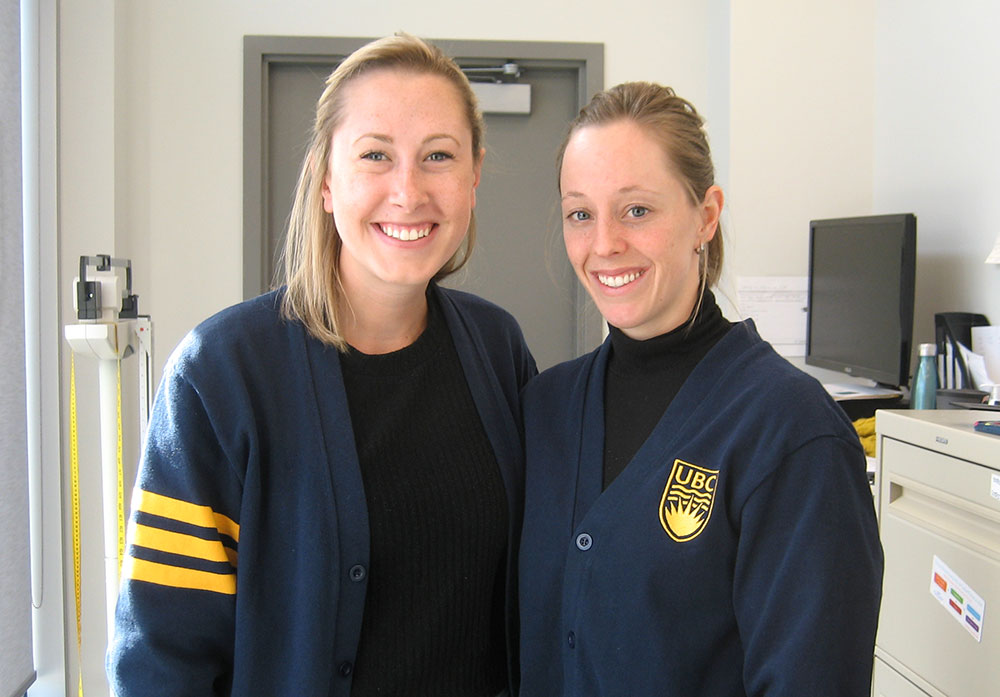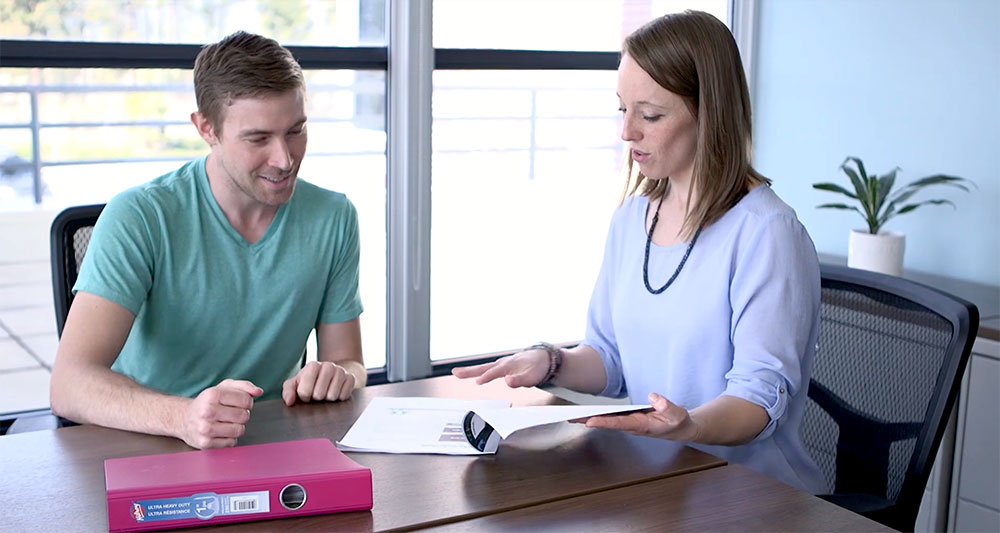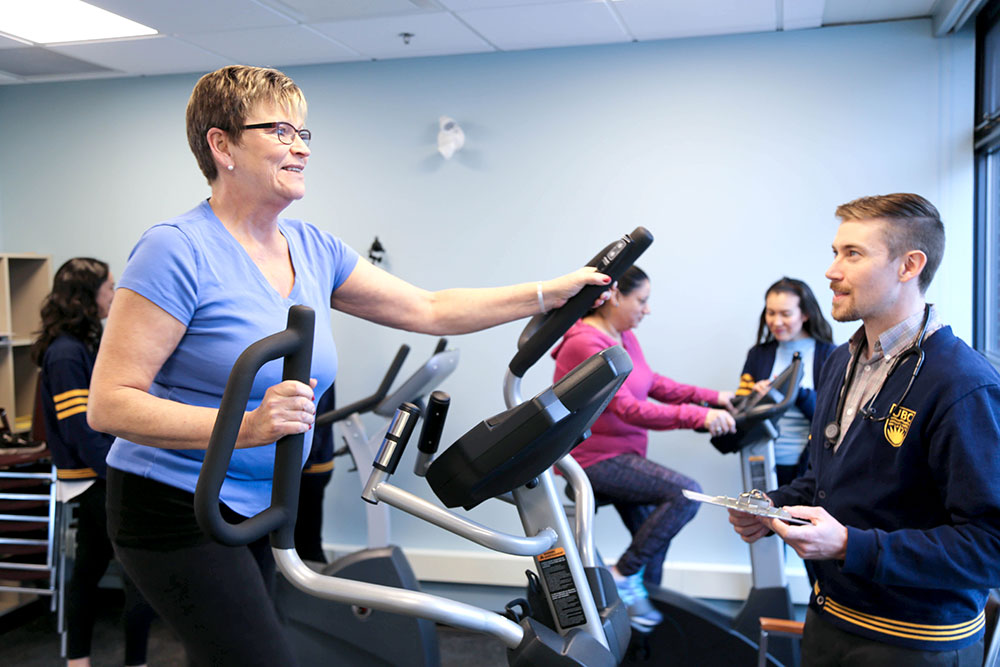
Location
YMCA – Kelowna
Project
Small Steps for Big Changes – presented at UBC Okanagan Diabetes Research Day 2019
Faculty
Faculty of Health and Social Development
Professor
Mary Jung, Associate Professor
THERE’S AN ECHOING CLUNK AS WEIGHTS FALL TO THE FLOOR and a steady patter of feet hitting treadmills. These are familiar and comfortable sounds for UBC Okanagan students Ashtyn Baxandall, doctoral student Tineke Dineen and postdoctoral fellow Corliss Bean — the gym has become their second home.
This was not the case for Lois Hourston, a retired media professional who lives in Kelowna. The dizzying beat of electronic dance music, flashing digital screens and gym rats scurrying from machine to machine was intimidating and uncomfortable for this exercise-rookie. Yet, she agreed to meet the students together in this unfamiliar spot.

Hourston is a graduate of Small Steps for Big Changes, a three-week lifestyle-counselling program delivered by UBC Okanagan students and researchers at the Kelowna YMCA. The program helps people make lasting dietary and exercise changes to lower their risk of developing Type 2 diabetes.
And, in this unusual academic setting of the YMCA, the UBCO students are learning about research, counselling and themselves as they advance through their degrees.
The Diabetes Association of Canada defines the disease as one in which the body either can’t produce insulin or can’t properly use available insulin to regulate blood sugar. Complications from diabetes can include kidney or eye damage and an increased risk for heart disease or stroke.
While Type 1 diabetes is an unpreventable autoimmune disease where individuals no longer produce insulin, Type 2 diabetes — where people either don’t produce enough insulin or can’t use it efficiently — can be prevented with a healthy lifestyle.
“Nine out of ten people with prediabetes (a condition where blood sugars are higher than normal) don’t know they have it,” says exercise scientist Mary Jung, associate professor at UBCO’s School of Health and Exercise Sciences and founder of the Small Steps for Big Changes program.

“Without weight loss and moderate physical activity up to 30 per cent of these individuals will develop Type 2 diabetes within five years,” warns Jung. “Across Canada, we know that up to 80 per cent of Type 2 diabetes cases are preventable by adopting a healthy lifestyle.”
Jung initially launched the Small Steps for Big Changes program on UBC’s Okanagan campus. Proof of the program’s effectiveness was in the low-sugar pudding. First developed as a pilot trial in 2012 with 32 adults with prediabetes, the program then was tested in a full-blown randomized controlled trial including 100 participants. The majority of these participants continued exercising, improved their fitness levels, decreased their weight and waist size, and improved their overall health long after the intervention was over, up to one year later.
“Across Canada, we know that up to 80 per cent of Type 2 diabetes cases are preventable by adopting a healthy lifestyle.”
“This was very encouraging. Many similar programs have been great at the beginning,” says Jung. “But the real challenge is to encourage lifelong participation and continued buy-in.”
To better reach this at-risk group and minimize barriers to those who really could benefit from the program, Jung and her team decided to move the program from the halls of academe to those in the community, partnering with the YMCA in 2016.
“We know if we can get those at risk of diabetes, we can change them,” she says.
Reaching the community and sharing the program’s success is pivotal for Jung and the continuation of Small Steps for Big Changes. Not only does Jung take the opportunity to present her findings at community events, sharing knowledge with peers has been equally rewarding.
Each year UBC holds Diabetes Research Days on both campuses. Sponsored by the BC Diabetes Research Network, these meetings are a forum for research presentation, idea-sharing and brainstorming.
“Input from both the community and our peers is incredibly valuable,” says Jung.

Ashtyn Baxandall’s first foray into research wasn’t until the fourth year of her human kinetics program. As part of her coursework, Baxandall assisted UBCO postdoctoral fellow Corliss Bean with her study to explore women’s journeys through the Small Steps for Big Changes program. They connected with clients several months after the program was finished to see if they are still following the guidelines.
Baxandall’s initial task was to transcribe phone interviews between the counsellor and the study participant. As she typed, Baxandall was sparked by the personal accounts and saw how applying behaviour change theory changed lives.
“Until then, my learning had all been in class and was theory-based,” says Baxandall. “Then I heard the anecdotes of individuals working through the program. I heard their highs and lows. These were real-life histories validating all I had learned in my classes. I loved listening and I wanted to be part of this initiative.”
Following through on her enthusiasm, Baxandall then volunteered with the Small Steps for Big Changes program at the YMCA and her learning experience began anew.
She took advice from her mentor Tineke Dineen, a UBCO doctoral student and counsellor with Small Steps for Big Changes, who suggested Baxandall join a two-day workshop about motivational interviewing.
“We help provide a roadmap, but the participants remain in the driver’s seat.”
“Motivational interviewing is a different counselling style,” says Dineen. “It is about finding meaningful or motivational reasons to adopt change. Our participants are encouraged to first discuss their reasons to change. Then, during non-judgemental follow-up conversations, we reflect on their opinions and their own ideas on ways to follow through. We help provide a roadmap, but the participants remain in the driver’s seat.”

Dineen has a lot of experience helping Small Steps for Big Changes’ participants learn their own potential. Similar to Baxandall, she joined the program after hearing some of the personal success stories.
“The Small Steps for Big Changes program resonated with me because it focuses on sustainability, it’s embedded in the community and it helps prevent the progression of Type 2 diabetes,” Dineen says enthusiastically.
She started as a research coordinator with the program, but has now transitioned to a doctoral student. She’s investigating participant outcomes and examining how the program could be implemented in additional YMCA gyms. “The more I worked with Small Steps for Big Changes, the more I appreciate how effective it is.”
Dineen believes that part of the program’s success rests with its setting within the YMCA facility. She says participants enjoy coming to the YMCA because it’s a comfortable community hub where they see the same trainers, drop-in anytime and continue to exercise on their own, even after they have completed the Small Steps for Big Changes intervention. “The YMCA is a friendly venue that helps maintain the behaviour change,” she says.

That friendly environment has helped Hourston along her Small Steps for Big Changes journey. She had no idea that she had prediabetes until she received a call from her physician. “I was not expecting to hear this news,” she says.
With encouragement from her doctor, Hourston called the Small Steps for Big Changes program and was accepted as a participant. “I was thrilled to have a solution.”
After only a few weeks of training and counselling at the YMCA, her condition began to improve. Hourston enjoyed being accountable for her choices and the team approach at the YMCA. “There is always a friendly face to greet you. I feel very much at home.”
Baxandall agrees: “Working at the YMCA has been a unique experience. It has been empowering to work with participants who are facing barriers in their lives and to help them make positive-lifestyle changes with their diets and exercise,” she says.
This year will see many graduates along with Hourston and the 240 other participants that have completed the Small Steps for Big Changes program, keeping diabetes at bay with dedication and perseverance. Baxandall will also complete her academic studies at UBCO and continue on to a Master of Occupational Therapy at the Glasgow Caledonian University starting January 2020.
Although the stages the clients and students may walk upon may be different, the feelings of accomplishment and pride will be the same.